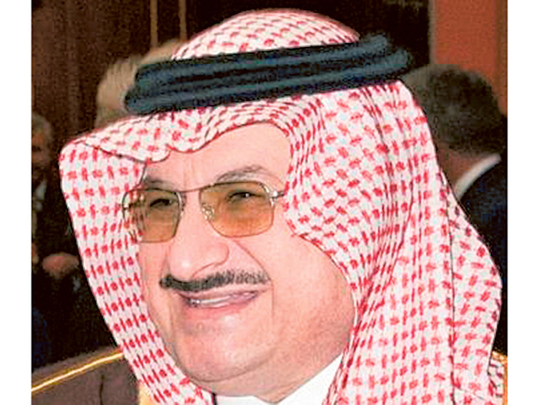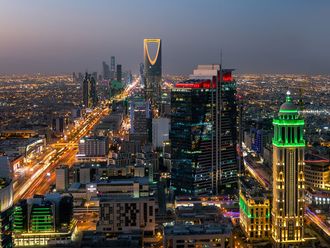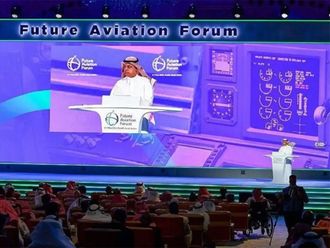
Riyadh: Saudi Arabia has raised the alarming prospect of the Middle East becoming embroiled in a nuclear arms race after the country’s blunt warning that “all options are on the table” if Iran fails to resolve the international stand-off over its nuclear programme.
Prince Mohammad Bin Nawaf Bin Abdul Aziz, Saudi Arabia’s long-serving ambassador to London, says that for many years the kingdom upheld the policy established by the late King Fahd that Riyadh would not pursue a policy of developing nuclear weapons. “Then it became known that Iran was pursuing a policy that could be shifted to a weapons-of-mass-destruction programme,” Prince Mohammad explained in an exclusive interview.
“This has changed the whole outlook in the region.” Like many in the Arab world and beyond, the Saudis are hoping the current negotiations with Iran on the nuclear issue, being led by US President Barack Obama, will provide assurances that Tehran does not possess the means to build an atom bomb.
“We have always expressed our support for resolving the Iranian nuclear file in a diplomatic way and through negotiation,” said Prince Mohammad. “We commend the American president’s effort in this regard, provided that any deal reached is watertight and is not the kind of deal that offers Iran a licence to continue its destabilising foreign policies in the region. The proof is in the pudding.” Negotiations between Iran and the P5+1 — the US, the UK, France, China and Russia (the five permanent members of the UN Security Council) and Germany — are due to be concluded by the end of this month.
Negotiators are pressing Tehran to freeze key elements of its uranium-enrichment cycle — which can be used to produce nuclear warheads — in return for easing the sanctions that have crippled the Iranian economy. Despite attempts lasting more than a decade to resolve the issue, Iran has yet to make any significant concessions on its nuclear programme. The New York Times reported last week that Tehran’s stockpile of nuclear fuel had increased by 20 per cent in the past 18 months. That would make a nonsense of the Obama administration’s contention that Iran had frozen its enrichment operations for the duration of the negotiations.
Consequently, there are fears in Saudi Arabia and the other Gulf states that Obama is more interested in reaching an accommodation with reformists in Iran than in standing by America’s traditional allies in the Arab world.
Prince Mohammad, who is a senior member of the Saudi ruling family, insists the negotiations must produce serious commitments from Iran not to produce nuclear weapons. “We hope we receive the assurances that guarantee Iran will not pursue this kind of weapon,” he said. “But if this does not happen, then all options will be on the table for Saudi Arabia.
‘Direct threat’
“Iran’s nuclear programme poses a direct threat to the entire region and constitutes a major source and incentive for nuclear proliferation across the Middle East, including Israel.”
Western intelligence agencies believe that the Saudi monarchy paid for up to 60 per cent of Pakistan’s nuclear programme, in return for the ability to buy warheads for itself at short notice.
Any failure by Iran to provide the necessary safeguards by the end of this month could see Riyadh activate that deal, thereby enabling Saudi Arabia to become the Arab world’s first nuclear power.
And if that were to happen, then many other regional powers, such as Egypt and Turkey, would also attempt to follow suit — a nuclear arms race in the world’s most unstable region.
Speaking on Yemen, Prince Mohammad said, “Al Houthi militants, backed by Iran, set about taking over Sana’a and then attempting to take over Aden,” he said.
“The reason air strikes became necessary was to reverse that advance and keep the road open for a political solution. “All the evidence supports the fact that Iran is using Al Houthis as warring agents for them to transform Yemen into a springboard for the delusional hegemonic designs in the Arab world.”
He played down suggestions that, equipped with its new military might, his country had its own plans for regional domination.
“Saudi Arabia does not have the same ambitions for the region as others do,” he said in a reference to Iran. “All we care for is the preservation of our stability and security, and that of the Arab and Muslim worlds.”
The ambassador also expressed his concern about suggestions that Britain was playing a less prominent role in world affairs. Last week Ashton Carter, the US defence secretary, warned against what he called Britain’s “disengagement” from world affairs in the wake of the recent defence cuts. Prince Mohammad warned that this could have negative repercussions, particularly in the Middle East.
“The perception that Britain is withdrawing from the international stage could have a negative impact,” he said. “Britain has played a historical role in the region due to its colonial past. It knows the Arab world very well and it can still have a pivotal positive role. To see a country like Britain no longer playing a central role in the region will have ramifications that are not positive.”
— The Telegraph Group Limited, London 2015











